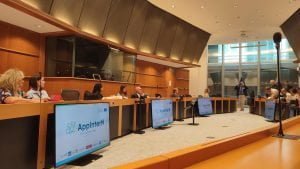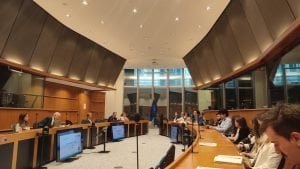- AppInterN aims to strengthen links between students and companies for the insertion into the world of work
- Finnova and the Destine project are committed to the values supported by this initiative
17/07/2023, Brussels. Last Thursday July 13 at 14:00 (CEST), the final event of the AppInterN (Appreticeship Inter Network) initiative was held, whose objective lies in strengthening the ties between students and graduates with companies. The main purpose is to motivate and involve companies to actively participate in offering internships for students and recent graduates of Vocational Training. Finnova and the Destine project are committed to the values supported by this initiative, and therefore attended the final AppInterN event at the European Parliament in Brussels.
Giulia Meschino, Director of the European Association for Vocational Education and Training, opened the event. Meschino welcomed the attendees and applauded the success of the initiative, underlining the cooperation and the bond that has been created between the AppInterN partners.
The first speaker was Anna Carrero, member of the Directorate General for Employment, Social Affairs and Equal Opportunities of the European Commission. Carrero highlighted the good practices that the Commission disseminates in the field of vocational training, highlighting the European Alliance for Apprenticeship Training promoted by the Commission itself, which advocates the quality, supply and general image of apprenticeship training throughout Europe. Carrero also pointed out the need to provide quality vocational training that allows the acquisition of skills, framing this within the European Year of Skills. To close his speech, Carrero recalled that during the Spanish presidency there will be events related to the support of quality vocational training and the promotion of good practices in this area.

The next speaker was Athanasia Theodoridou, director of the vocational training area of the Greek Public Employment Service (DYPA). Theodororidou explained the details of the project, being part of the AppInterN lead entity. The project has been carried out in Spain, Greece and Italy, strengthening ties between trainees and sharing information from each national labor market. The initiative has relied on a successful methodology applied to each country’s environment, developed in 6 phases: linking AppIntern to European initiatives, analyzing the database of graduates and companies in each participating country, choosing 10 specialties for each country, creating the national portal and implementing the platform’s exploitation plan.
Then, partners from the three countries represented took the floor to explain the experience they have had as part of AppInterN. Yannis Papadimitriou, a member of DYPA, highlighted the challenge of launching the project at the beginning of the pandemic, bringing activities and meetings to an online format. However, Papadimitriou described the experience as successful, and was pleased to have created a network between stakeholders, companies and students, “which is the key to the project”. As a final note, Papadimitriou pointed out that the main conclusion of the project is the need for more frequent information and more information on the labor market for all stakeholders.
Annalisa Ferrari, as representative of Unitelma Sapienza University, highlighted the time savings that the platform provides the students when looking for a job, as it is a meeting point with clear information for both students and companies. In Italy, the platform focused on 10 professional profiles that matched the country’s employment context, on diverse sectors such as catering, tourism marketing, ICT services and construction. Paula Zaplana, as part of PIMEC Formació, also told how the methodology was transferred to the Spanish context.

The closing of the event was a panel of experts with the participation of three representatives of the partners that have been in the project. Sara Mandis, representative of OBESSU, focused her presentation on the differences that students have in accessing a job according to their socioeconomic context. “The schools where you have studied matter, the economic support behind you matters, but there are students in situations of vulnerability who have to turn down opportunities because they cannot afford it,” Mandis concluded. To close her speech, she also stressed the importance of bringing tools that favor inclusion to companies.
Lisa Simons, as representative of CSR Europe, highlighted the challenge of climate change in the business world: “climate change has been treated as an issue isolated from society; fortunately, we have realized that we are also part of this problem”. Simons advocated a social and just transition, framed with the values of the EU Green Deal, and acknowledged that companies are now more focused on their employees, especially as a result of the difficulties that the pandemic arose. To conclude her speech, Simons presented the Upskill 4 Future project, which aims to raise awareness, train and serve as a springboard for initiatives to improve skills in companies.
The last intervention was made by Vassilis Siomadis, as representative of IME GSEVEE, and he stressed the role of companies in producing knowledge and skills. “Classrooms do not give you the opportunity to attend the life of the company, the production process,” concluded Siomadis. Finally, he took the opportunity to extol the values of AppInterN, “which has created a common understanding about apprenticeships, the expectations of the company and those of the students.”
About the Finnova Foundation
FINNOVA is a non-profit foundation working for the promotion and development of innovation and entrepreneurship at EU level. Headquartered in Brussels with an affiliated organization in Spain, FINNOVA operates through collaborations and partnerships in all EU countries. FINNOVA’s expertise in leading communication and dissemination activities for EU projects is combined with a strong proven track record in start-ups and business support programs such as accelerators, incubators and selection events and award ceremonies/ceremonies. FINNOVA also supports EU projects through advocacy and EU-level analysis of the legal and regulatory framework and barriers, to support the advancement of innovation across Europe.
About DESTINE
The Erasmus DESTINE (DivErSity and Tolerance IN E-Environment) project was born with the aim of promoting online professional training that ensures support for diversity, inclusion and tolerance, providing the necessary tools for all professionals and students to adapt to the e-learning methodology. DESTINE focuses especially on those vocational training students who need a learning environment adapted to their needs.

